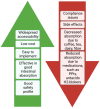Iron Deficiency Anemia in Inflammatory Bowel Diseases-A Narrative Review
- PMID: 34836263
- PMCID: PMC8624004
- DOI: 10.3390/nu13114008
Iron Deficiency Anemia in Inflammatory Bowel Diseases-A Narrative Review
Abstract
Inflammatory bowel disease (IBD), which includes Crohn's disease and ulcerative colitis, is characterized by chronic inflammation of the gastrointestinal tract. IBD has been associated with numerous symptoms and complications, with the most common being iron deficiency anemia (IDA). Iron deficiency in IBD is caused by inadequate intake, malabsorption (including duodenal involvement and surgical removal), and chronic blood loss by mucosal ulcerations. Therefore, an appropriate diet should be enforced. Iron deficiency and iron supplementation have been associated with alterations to gut microbiota. IBD-associated anemia, in particular iron deficiency anemia, is associated with a significant decrease in quality of life and with clinical symptoms such as chronic fatigue, headaches and dizziness, reduced exercise tolerance, pale skin, nails, conjunctiva, and fainting. However, despite these numerous adverse symptoms, IDA remains undertreated. The European Crohn's and Colitis Organisation (ECCO) guidelines state that patients should be monitored for anemia. Adequate treatment, whether oral or intravenous, should be implemented while taking into consideration C-reactive protein values (CRP), hemoglobin levels, and therapeutic response. It should be stressed that every case of anemia in IBD patients should be treated. Intravenous iron formulations, which are more superior compared to the oral form, should be used. There is a need to increase awareness and implementation of international guidelines on iron supplementation in patients with IBD.
Keywords: IBD; IDA; dietary factors; dysbiosis; iron deficiency; iron metabolism; microbiota.
Conflict of interest statement
The authors declare no conflict of interest.
Figures


References
-
- Aksan A., Beales I.L., Baxter G., Ramirez de Arellano A., Gavata S., Valentine W.J., Hunt B. Evaluation of the cost-effectiveness of iron formulations for the treatment of iron deficiency anaemia in patients with inflammatory bowel disease in the UK. CEOR. 2021;13:541–552. doi: 10.2147/CEOR.S306823. - DOI - PMC - PubMed
-
- Ng S.C., Shi H.Y., Hamidi N., Underwood F.E., Tang W., Benchimol E.I., Panaccione R., Ghosh S., Wu J.C.Y., Chan F.K.L., et al. Worldwide incidence and prevalence of inflammatory bowel disease in the 21st century: A systematic review of population-based studies. Lancet. 2017;390:2769–2778. doi: 10.1016/S0140-6736(17)32448-0. - DOI - PubMed
Publication types
MeSH terms
Substances
LinkOut - more resources
Full Text Sources
Research Materials
Miscellaneous

